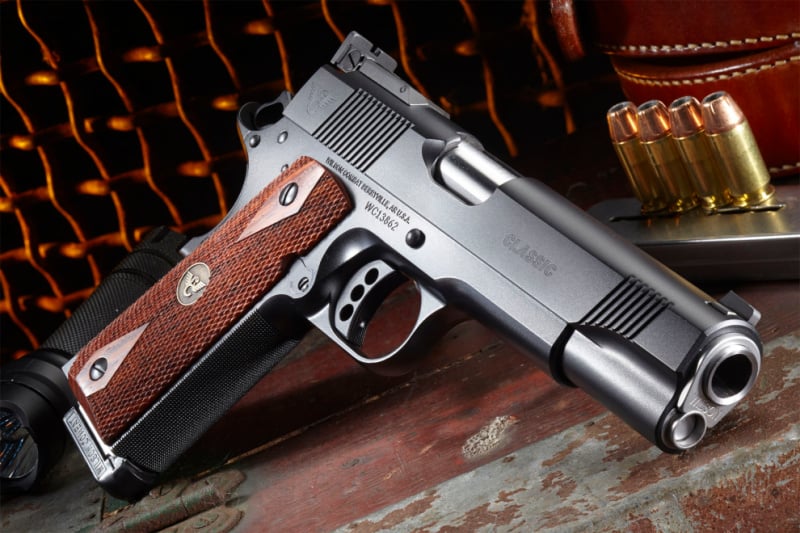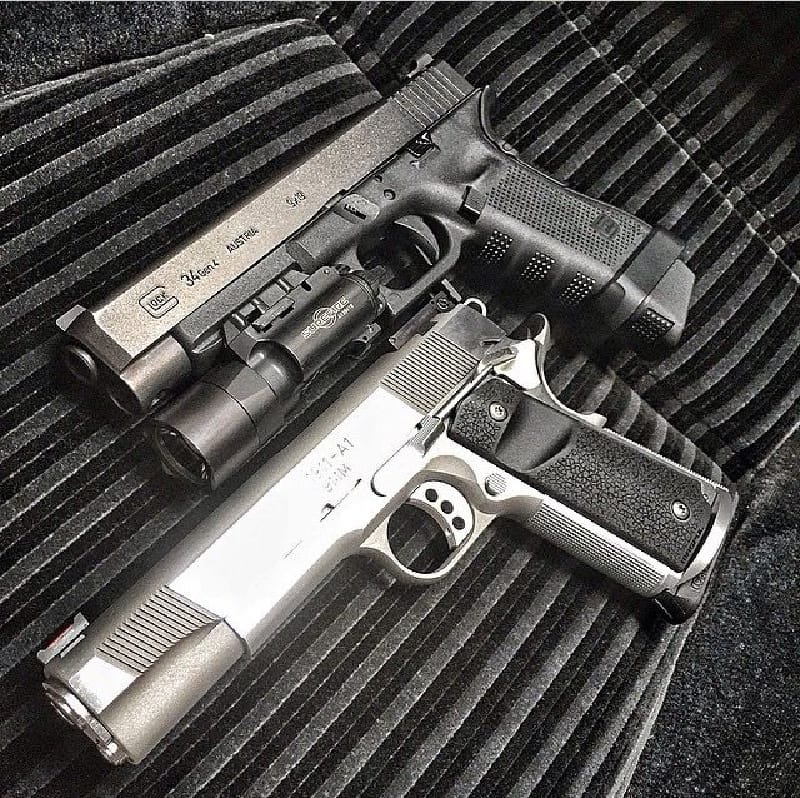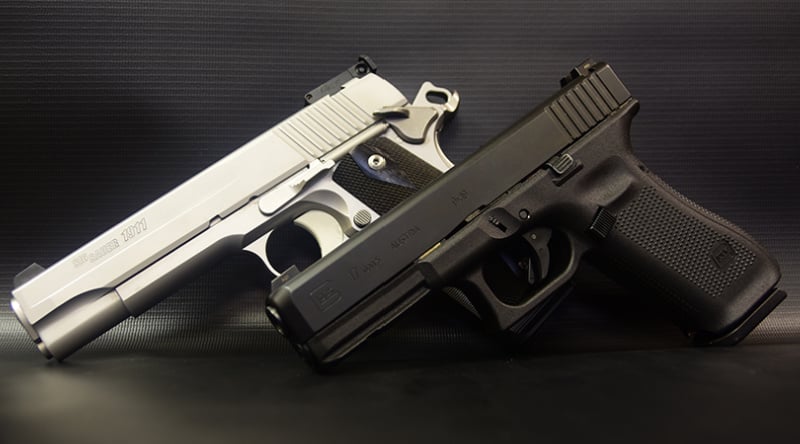In the great debate of what materials handguns should be made from, there tends to be quite a divide between those who prefer polymer and those who want all-metal guns. The truth is that one isn’t necessarily 100% better than the other. That’s because guns are purpose-driven tools, and the material your handgun is made from is going to depend on your personal needs, skills, and usage. If you can’t decide whether to go with an all-metal handgun or a polymer pistol, we’re here to help. These are the pros and cons of metal versus polymer handguns, along with a few tips on how to choose the right material for your next handgun.
The Polymer Pistol

The most popular handgun made from polymer is the Glock. It’s been around for decades and has a reputation for being durable, reliable, and accurate. Glocks are also priced at levels that tend to be way more affordable for the average shooter than many guns, so it’s really no surprise they’re well-loved. They’re also highly customizable and even though Glock improved their triggers a bit with the Gen 5, the trigger of the Glock is still typically the first part to go.
You might be thinking polymer pistols are entirely polymer, but they aren’t. The slides remain steel, it’s the frame that’s polymer. It’s important to understand that even within the realm of polymers there are multiple proprietary plastics and types. Just like metals, all plastics and polymers aren’t alike. A gun made from one plastic might be far more durable than another that can be damaged easily.
There are a lot of pros to polymer, including:
- Lighter weight.
- Can be easily molded to specific angles and shapes.
- More cost effective.
- Customizable.
- Simple to texture grip as desired.
- Resistant to the elements.
- Won’t rust.
- Can be dyed various colors.
- Has better flex than metal.
- Generally easier to mount a red dot sight.
Cons of polymer pistols:
- Sometimes poorly balanced.
- Could be crushed or cracked more easily than many metals.
- Not as appealing, aesthetically.
- A lighter weight means it doesn’t reduce felt recoil and muzzle rise as effectively.
- Heat corrosion can be an issue.
- The longevity of frame life isn’t as extensive as metal frame handguns.
The Metal Handgun

In this context, metal handguns have a metal frame and slide. When most people think about metal handguns they tend to picture 1911s, but in reality there are far more all-metal models than only the 1911. For example, the Smith & Wesson M&P9 M2.0 Metal is, as its name suggests, solid metal. Standard M&P pistols are polymer, but Smith & Wesson recognized the need for a metal option as well. Many gun owners prefer the solid feel of metal frames and also enjoy the fact that the heavier material translates to mitigated felt recoil and muzzle rise. Of course, there are many variations on metal handguns.
Metal handguns might be made from stainless steel or could be manufactured from an aluminum alloy. There are even frames made from a variety of metals such as copper, zinc, tin, and tungsten. The possibilities are practically endless. Metal frame handguns with grip panels might have wooden, plastic, ivory, or other materials used for the grips. Some metal handguns have frame inserts rather than grip panels, and those are typically polymer.
Quite a few pros exist to using metal frame handguns:
- Longevity is usually impressive (it can literally be centuries).
- The heavier weight of some metals creates better balance with the bulk of the barrel and slide.
- Greater overall weight means less felt recoil and muzzle rise, which can mean greater accuracy.
- Classic aesthetic appeal.
- Durable and resistant to wear and tear.
- Not affected as much by extreme heat (for example, unlikely to deform).
Cons of metal handguns include:
- Heavier weight can be harder for some shooters to hold up and aim properly.
- If it’s aluminum rather than steel, there’s no bonus of added weight.
- Might be prone to cracking at stress points.
- Could rust or become tarnished.
- Higher cost.
- Fewer customization options.
- Harder to add weapon-mounted light if it wasn’t manufactured with an integral accessory rail (accessory rails are less common on metal handguns than on polymer).

Are polymer handguns better than metal handguns?
When it comes down to it, there are pros and cons to both types of handguns. And even if you think you’ve decided what material you like, you’re going to discover that the specifics of the frame depend on the manufacturer’s materials. Before you even begin considering whether to get a polymer or metal handgun, you should stop and consider what you need the gun to do. Once you have that figured out, it would be wise to handle both polymer and metal handguns to find out what feels better in your hands. Of course, price is going to be a factor, too. Polymer guns are simply more affordable than well-made metal guns.
Generally speaking, the advantages of polymer frames outweigh the pros of a metal frame if you’re in the market for a self-defense handgun. This is especially true if you’re looking for a pistol you can carry on-body comfortably. Cutting ounces and having a polymer frame against your skin can be far more comfortable than the bulk and chill of metal. However, if you want a large-bore handgun, a hunting handgun, or just like the classics, metal is worth checking out. Remember, steel and aluminum are not the same thing. Make sure you know what type of metal a handgun is made from (just like you should do your homework and find out how durable a polymer frame from a specific manufacturer really is).

Ideally, everyone would have at least one polymer and one metal handgun. Versatility and options are great things. When it comes right down to it, you’re going to have a personal opinion and preference for one over the other, but that doesn’t mean you shouldn’t be familiar with both. Limiting yourself to only metal handguns or only polymer pistols is no way to become a well-rounded shooter. That, and it’s smart to leave your gun biases behind. The impressive versatility of polymer cannot be denied just as the longevity and weight advantages of metal handguns are obvious.
Times are constantly changing thanks to advances in technology. After all, today we have polymer frame 1911s and metal frame models that were traditionally polymer. Who knows what the future might hold for gun owners?
Tell us what your personal gun preferences are in the comment section, and don’t forget to mention why.


